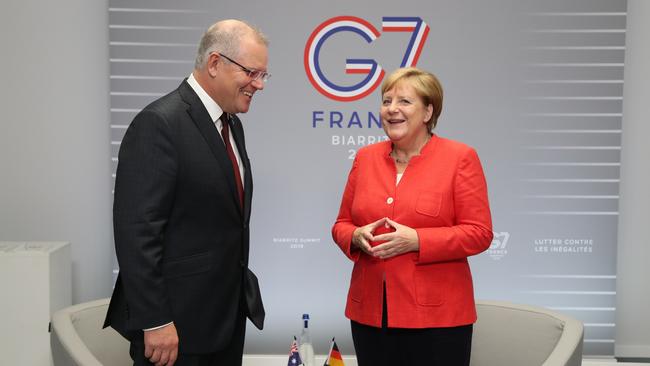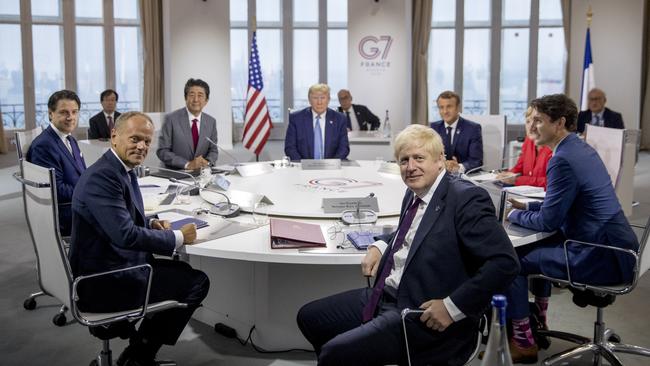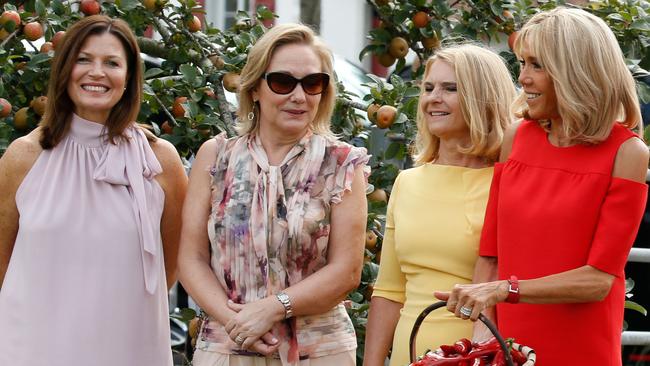Trump hints at tariff cooling-off
Donald Trump said he was having ‘second thoughts’ about the China trade war, but officials were quick to say he was misinterpreted.

US President Donald Trump said he was having “second thoughts” about the deepening trade war with Beijing, just hours before he was due to meet overnight with Scott Morrison on the sidelines of the G7 summit in Biarritz.
Coming off meetings in Vietnam and the Pacific Islands Forum, the Prime Minister and Mr Trump were expected to focus on strategic issues in the Indo-Pacific and cover Australia’s commitment to the US-led taskforce to protect shipping in the Strait of Hormuz.
Mr Morrison, who in the past backed the US in claiming it had legitimate grievances with China, said before arriving in Biarritz on Saturday night that the meeting was being held against a backdrop of increasing global instability.
It was expected that the trade war between the US and China would dominate discussions, but Mr Trump appeared to signal regret yesterday for the deepening tensions, amid growing concerns about the prospect of a global economic slowdown.
During a breakfast meeting with British Prime Minister Boris Johnson, Mr Trump suggested he had qualms about the spiralling conflict. “Yeah. For sure,” he said, adding that he had “second thoughts about everything”.

But several hours later, White House press secretary Stephanie Grisham said Mr Trump’s answer had been “greatly misinterpreted”. In a statement, she said, “President Trump responded in the affirmative — because he regrets not raising the tariffs higher.”
Following Beijing’s announcement on Friday that it would slap new tariffs on $US75 billion ($111bn) in American goods, Mr Trump responded with more tariffs of his own and issued an extraordinary threat to declare a national emergency in an attempt to force US businesses to cut ties with China. In a series of angry tweets hours after China’s move, Mr Trump said: “We don’t need China and would frankly be far better off without them.”
Mr Morrison has said the summit was “taking place amid increasing global economic headwinds, threats to global security and stability and sharpening trade tensions’’.
“All of these developments have implications for our national interests,’’ he said. “This forum will be an important opportunity to listen and to put forward Australia’s views on these global challenges.”

Mr Morrison is also using the G7 forum to try to head off a European push, led by France, for an international tax standard to be applied to digital companies such as Google and Facebook because of fears it could be extended and hit Australia’s commodity exports.
“Australia is on the leading edge in the world on dealing with digital platforms,” he said.
“This is what I want to share. The big thing I’m trying to push is that all we want is for them to be subject to the same rules as everyone else in the physical world … whether that is paying taxes, respecting consumer laws to tackling online violent extremism and terrorism.”
The push from France for changes to international tax standards would tax the domestic revenue base of digital companies within a country even if their headquarters were located elsewhere.
The French proposal, dubbed the “Google tax”, has been attacked by Mr Trump, who has threatened to impose tariffs against France in retaliation.
However, Mr Morrison sought to enlist the support of the OECD in blocking the European model, with Australia using the G7 to argue that the proposal could potentially be extended beyond digital companies to capture other areas of trade, including Australia’s commodities sector. He conveyed his concerns about the tax proposal with German Chancellor Angela Merkel yesterday.
The Prime Minister has already notched up a win at the summit, which Australia is attending for the first time as an observer state, striking agreement with the OECD to fund new protocols around digital companies to prevent, detect and remove violent extremism from online platforms.
“This is all about stopping online terrorist and extremist activity,” he said. “We can’t allow the internet to be a safe haven for terrorists and violent extremists to recruit or promote their despicable propaganda.
“We’ll establish a set of standards for online platforms and provide clarity about how they are protecting their users. The onus will be on these online platforms to meet these standards, and be transparent about it if they don’t.”




To join the conversation, please log in. Don't have an account? Register
Join the conversation, you are commenting as Logout